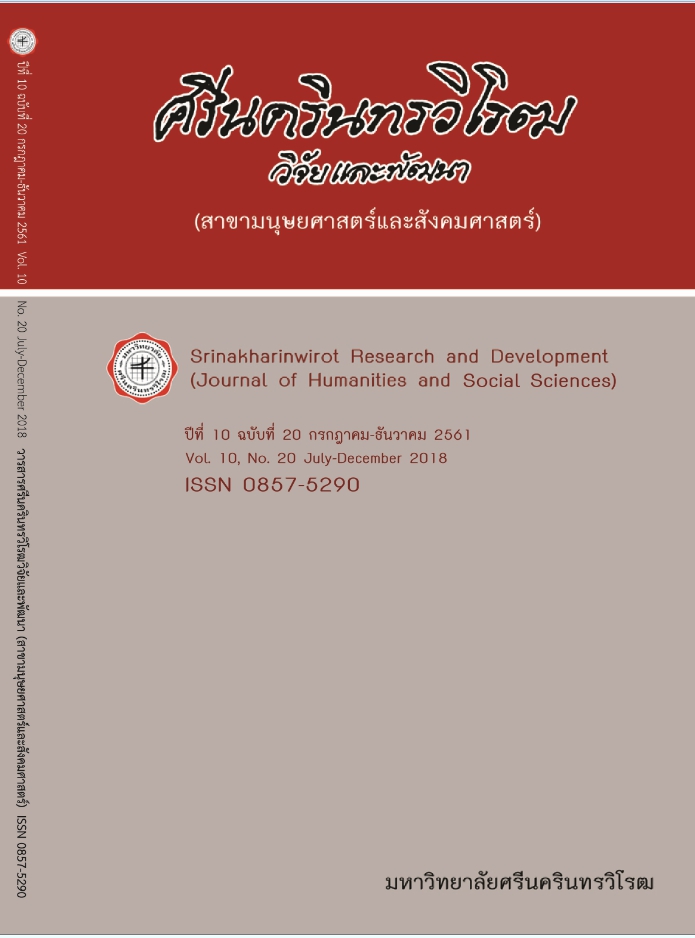การพัฒนารูปแบบการให้การปรึกษากลุ่มที่มุ่งเน้นการกระทำเพื่อเสริมสร้างพฤติกรรมเอื้อสังคมของนิสิตนักศึกษาชั้นปีที่ 1 มหาวิทยาลัยของรัฐในเขตกรุงเทพมหานคร THE DEVELOPMENT OF ACTION GROUP COUNSELING FOR ENHANCING PRO-SOCIAL BEHAVIOR OF FIRST YEAR STUDENTS OF PUBLIC UNVERSITIES IN BANGKOK METROPOLIS
Keywords:
Pro-Social Behavior, Action Group Counseling, Group CounselingAbstract
The purposes of this research were 1) to study the pro–social behavior of the faculty of public universities in Bangkok., 2) to develop an action group counseling model for enhancing pro–social behavior of public universities in Bangkok., and 3) to study the effect of the action group counseling model for enhancing pro–social behavior of the first year students of Srinakarinwirot university. The samples of the study included 2 group. The first group of the pro- social study consisted of 400 students. Those were selected by multi-stage random sampling from the population. The second group of the study was purposively selected from the first group. This second group consisted of 24 students whose pro – social behavior scores were lower than 50th percentile. They were then randomly selected into 2 groups, classified as an experimental group and a control group. Each group consisted of 12 students. The research instruments were 1) pro – social behavior scale with Item discrimination ranged from .25 – .69, and with reliability coefficient (alpha) of .95. and 2) an action group counseling model for enhancing pro – social behavior with Item Objective Congruence (IOC) of 1.00.
The research results were as follows: are 1) The total mean score of pro–social behavior of 400 first year students of public universities in Bangkok were high (= 3.68, S.D. = .47) The pro-social behavior factors were high of helping, emphatic concern and cooperating, and the pro-social behavior factors were average of sharing and give information. 2) The action group counseling model for enhancing pro–social behavior of the students included concepts and techniques of the behavioral group counseling, cognitive behavior group counseling, and reality group counseling. This model included initial stages, working stage, final stage, and evaluation stage. 3) The effectiveness evaluation result of action group counseling model for enhancing the pro–social behavior of the faculty of public universities in Bangkok Metropolis are (1) Between posttest and pretest, the difference was statistically significant at the .01 level. Follow- up and pretest significantly differed at the .05 level. And posttest and follow-up significantly differed at the .01 level. The mean scores of the pro–social behavior after the experiment group and Follow-up were higher than before the experiment (2) Statistically significant differences in pro–social behavior scores between the experimental group and control group were found after the experiment and Follow-up at .01 level. The mean scores of the pro–social behavior of the experimental group after the experiment and after the follow- up were higher than of the control group. (3) Focus group report of the experimental group showed that they were satisfied with the action group counseling model. They have learnt the process of group counseling encouraging feeling, behaviors, and empathy toward each other. It also promoted friendly and trusted atmosphere which encourage each students to express themselves to exchange experiences to the group. Students also were more willing and able to accept, identify and adjust their previous attitudes and behaviors that could potentially be obstacles to their self-development. Students could effectively adapt and utilize these skills in any real world situations.
Downloads
References
[2] วิชัย วงษ์ใหญ่. (2554). การพัฒนาหลักสูตรระดับอุดมศึกษา. กรุงเทพฯ: อาร์ แอนด์ ปริ๊นท์.
[3] Baumeister, F; and J. Bushman. (2008). Prosocial Behavior: Doing What’s Best for Others. Social Psychology & Human Nature. Florida: Thomson Wadsworth.
[4] พระไพศาล วิสาโล. (2552). ทําบุญให้สุขภาพดี. กรุงเทพฯ: เนชั่นบุ๊ค.
[5] วิจารณ์ พานิช. (2555). วิถีสร้างการเรียนรู้เพื่อศิษย์ในศตวรรษที่ 21. กรุงเทพฯ: มูลนิธิสดศรี-สฤษดิ์วงศ์.
[6] Corey, G. (2005). Process and practice group. Belmont: Thomson Brook/Cole Inc.
[7] Cronbach, L. J. (1951). Coefficient alpha and the internal structure of tests. n.p.
[8] Robert V. Kail; and Rita Wicks-Nelson. (1993). Developmental Psychology. Cornell University. Prentice Hall.
[9] Corey, G. (2008). Theory and practice of group counseling. Belmont: Thomson Brook/Cole Inc.
[10] กาญจนา ไชยพันธุ์. (2549). กระบวนการกลุ่ม. กรุงเทพฯ: โอเดียนสโตร์.
[11] Corey, G. (2004). Theory and practice of group counseling. 6th ed. Belmont, CA : Brooks/Cole.
[12] Jacob, E., Mason, L; and Harvill, L. (2002). Group couseling strategies and skill. 4th ed. CA: Brook/Cole.
Downloads
Published
How to Cite
Issue
Section
License
Srinakharinwirot Research and Development Journal of Humanities and Social Sciences is licensed Under a Creative Commons Attribution-NonCommercial-NoDerivs 4.0 International (CC-BY-NC-ND 4.0) License, Unless Otherwise Stated. Please Read Journal Policies Page for More Information on Open Access, Copyright and Permissions.



